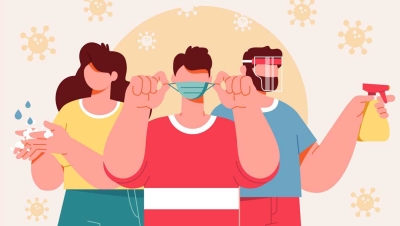Photo by Kori Nori via Unsplash
It’s all too easy for kids to run outside — and you after them — without first slathering on some sunscreen. However, there may be more benefits to the summer routine than you realize. From preventing sunburn to blocking acne, a little bit of sunscreen can go a long way.
1. Avoid Painful Burns
If your children go outside without sunscreen, they could get a sunburn. The extent of the burn will depend on how long they were out in the sun and their skin type. People who live closer to the equator are at an increased risk of getting sunburn due to the intense level of ultraviolet (UV) radiation in the atmosphere.
Sunburn weakens the skin and causes symptoms such as:
- Peeling
- Swelling
- Redness
- Itching
Stay safe by liberally applying sunscreen before going outside. You can also reduce the skin’s exposure to harmful light with a wide-brimmed hat.
2. Block UV Rays
The Earth's atmosphere is composed of many layers. The ozone layer is what protects us from the sun, absorbing harmful rays of radiation. It also absorbs UVB, a band of ultraviolet radiation with wavelengths that damage DNA.
While sunlight is necessary for health, it’s important to remember it can hurt your child. UV rays can even damage their skin on cloudy or rainy days. Apply sunscreen to block harmful rays from penetrating your child's skin, or have them wear long-sleeved clothing in light colors to decrease exposure.
3. Fight Against Acne
For tweens and teens who may already experience acne, sun exposure can worsen the damage. However, even kids with unblemished skin can face uneven color tones, redness, and inflammation after exposure to too much sun.
Some acne medications can heighten your skin’s sensitivity, making it more prone to sunburn. Always speak with your dermatologist about medication side-effects and how to prevent flareups, and be sure to use an oil-free sunscreen made for acne-prone skin. If it’s especially hot outside, try to limit your child's time in the sun, especially during peak daylight hours from 10 a.m to a few hours before sunset.
4. Enhance Skin Health
Your skin’s health is determined by essential proteins like collagen, elastin, and keratin, all of which can be zapped by sun exposure. A high-quality sunscreen will protect these proteins, leaving skin smooth and radiant.
- Collagen: Makes up most of your skin and wards of wrinkles and lines
- Elastin: Responsible for giving skin structure
- Keratin: Forms the rigid, protective barrier of your skin
In the summer, opt for a sunblock with a sun protection factor (SPF) of 30 or higher. Use enough to cover all exposed areas, including lips, ears and the part in your child's hair.
5. Prevent Skin Cancer
Enjoying the sun safely, which means reducing exposure and applying sunscreen, can prevent skin cancer like melanoma. Getting a sunburn just once every two years can triple your risk for developing the disease.
Unfortunately, you can't feel the UV rays that harm your skin, but they can do long-term damage even on cool, cloudy days. Getting burned once isn't cause for concern. However, you should take steps to protect your child's skin and reduce risk in the future through a combination of hats, long-sleeved clothing, and sunscreen.
The Benefits of Sunscreen
Start a new routine each morning where you and your child apply sunscreen before going outside. Even a short walk to school can be enough exposure to cause sunburn. Sunscreen also offers long-term benefits like enhanced skin health and protection against annoying acne.
Ask your dermatologist which type of sunscreen will work best with your skin type. Those who live in warmer climates should look for lotions with a higher SPF, which offers more protection. You can also reduce exposure by limiting your time outdoors and wearing long-sleeved clothing when it's cool. The most important thing is to stay safe while enjoying the great outdoors.







